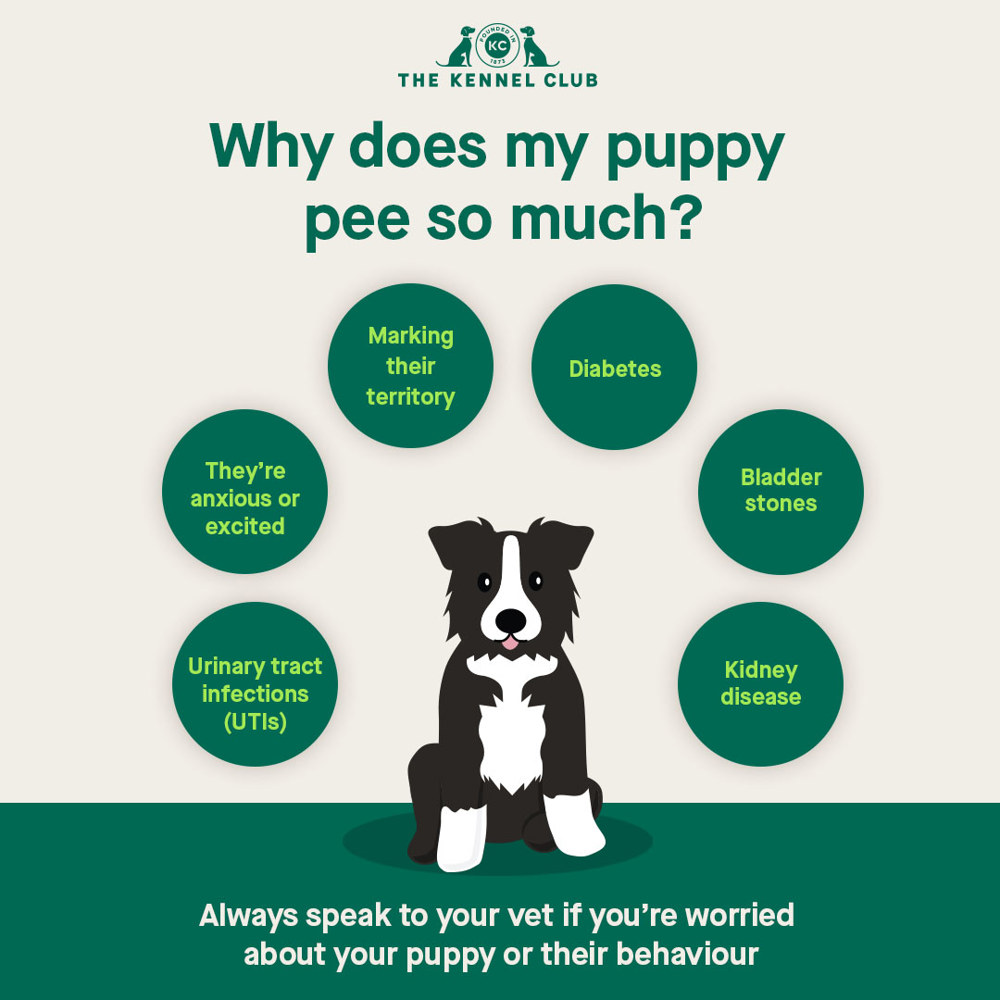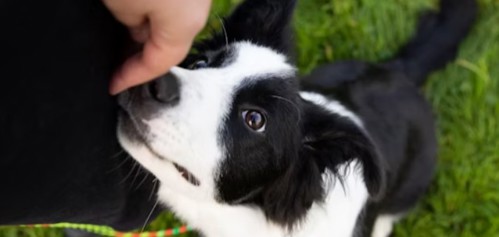
Have you ever looked at your new pup and thought “why does my puppy pee so much?” When we first bring them home and we begin the journey of toilet training, it can sometimes feel like a full-time job to keep up with their frequent “little accidents”. Like with any dog training, patience and consistency is key. However, it also helps to understand the differences in toilet habits between puppies and older dogs.
Why do puppies pee so frequently?
Puppies have smaller bladders than older dogs. They’re also growing and developing very quickly at this stage of life, which means their metabolic rates are higher. This combination leads to puppies peeing frequently. Not only that, but your dog’s age and breed will also impact on how often they need to pee. In general, as your puppy gets older, they won’t need to pee so often.
So, in general, how often should puppies pee?
This isn’t a straightforward question. There are a few different factors to consider.
- How old is your puppy? Very young puppies pee frequently - around every 30 minutes to an hour in fact. Puppies that are 3-6 months old can usually hold on for about 3 to 4 hours, while puppies 6 months and older can usually manage 4 to 6 hours between toilet breaks.
- What breed is your puppy? Smaller breeds mean smaller bladders and therefore, small puppies pee more often.
- How active is your puppy? If your puppy is energetic and playful, your puppy will pee more frequently because they’re burning more energy. Puppies can also pee when they get excited, so it’s a good idea to take them outside if you’re playing.
The best lifetime dog insurance
Protect your dog with the UK's Number 1 pet insurer, with up to £25,000 cover for vet fees.
Common medical issues that can cause your puppy to pee frequently
If your puppy is peeing a lot, and you have noticed any sudden changes in their behaviour, there may be some underlying medical issues that need to be looked at by your vet.
- Urinary tract infections (UTIs): UTIs can be painful, and can also make your puppy pee more often. Symptoms to watch out for include straining when they pee, bloody or cloudy urine, or having ‘accidents’ indoors.
- Diabetes: This condition will make your puppy feel more thirsty, because their body is trying to remove excess sugar from its system by urinating. If your dog is drinking more than usual, is losing weight or feeling lethargic, seek advice from your vet.
- Bladder stones: These stones start out as crystals, and they occur when there is an oversaturation of minerals in the bladder. They can occur in dogs of all ages, but some breeds are more likely to have this problem, particularly brachycephalic (flat-faced) breeds, like French Bulldogs and Pugs. Watch out for blood in the urine, repeated attempts to pee, or if your dog is making noise or showing discomfort when they urinate. Contact your vet for treatment.
- Kidney disease: While kidney disease tends to affect older dogs, chemicals, toxic foods, infections, medications and other illnesses can lead to kidney disease in puppies. Symptoms to look out for include excessive drinking and urination, which happens as the kidneys start to lose their ability to retain water. Seek treatment from your vet immediately.
Common behavioural issues that may cause your puppy to pee frequently
Sometimes instinct or learned behaviour is why your puppy is peeing more frequently. Here are some questions to consider:
- Is your dog anxious or excited? Puppies, particularly when they’re young, can have poor bladder control, and when they get excited, they may accidentally pee. The same can be said if they’re scared or nervous. Keep this in mind if they have any accidents, and use positive reinforcement and reassurance to train them out of this behaviour.
- Are they marking their territory? Dogs are hard-wired to mark their territory, and to stake a claim over their environment. Commonly males that have not been neutered will mark their territory by peeing and leaving their scent behind, although some females do this as well. While getting your dog neutered should help to curb this behaviour, there are other factors to consider before spaying your pet.
When should I be worried about my puppy peeing too much?
Accidents around the home are normal and to be expected, particularly when young puppies are involved. However, excessive peeing is a different story. Here are some symptoms to watch out for to help you tell the difference:
- Sudden changes in habits or behaviour: if your dog’s urination patterns change suddenly, that’s a sign that there may be an underlying health issue which is causing this.
- Other accompanying symptoms: if your puppy is lethargic, if they’re off their food or behaving strangely, again, this indicates that there may be a health issue that needs investigation.
- Does your puppy appear to be in pain or discomfort? Are they straining or making noise when they pee? Do they seem distressed?
If your dog exhibits any of the symptoms listed above, contact your vet as soon as you can.
Tips for toilet training a puppy that’s peeing a lot
- Keep to a routine. This is very important, as it sets a rhythm for your dog, and lets them know that there’s a time and a place for everything. Taking them outside often, particularly after playtime and meals, lets them know that they can expect a toilet break soon, so they don’t need to pee inside the home. Of course, when your puppy goes to the toilet outdoors, give them plenty of praise and positive reinforcement.
- When your puppy is indoors, keep an eye on them. That way, you can catch any accidents as they happen, and correct the behaviour. Never scold them if they pee inside. If you can’t watch them closely, pop them in a crate.
- Teach them commands for toilet breaks. Use these commands consistently to reinforce the behaviour.
- If your pet does have an accident in the house, remember to clean it thoroughly. Dogs have a habit of going to the toilet in the same place over and over, so if they can smell pee from a previous accident, rest assured they’ll return to that spot later. Use enzymatic cleaners to get rid of the odour. Don’t forget how much stronger your dog’s nose is compared to yours!
Find a vet near you
If you're looking for a vet practice near you, why not visit the Royal College of Veterinary Surgeons' Find a vet page.
Think your dog may be affected?
If you're worried about your dog's health, always contact your vet immediately!
We are not a veterinary organisation and so we can't give veterinary advice, but if you're worried about any of the issues raised in this article, please contact your local vet practice for further information

